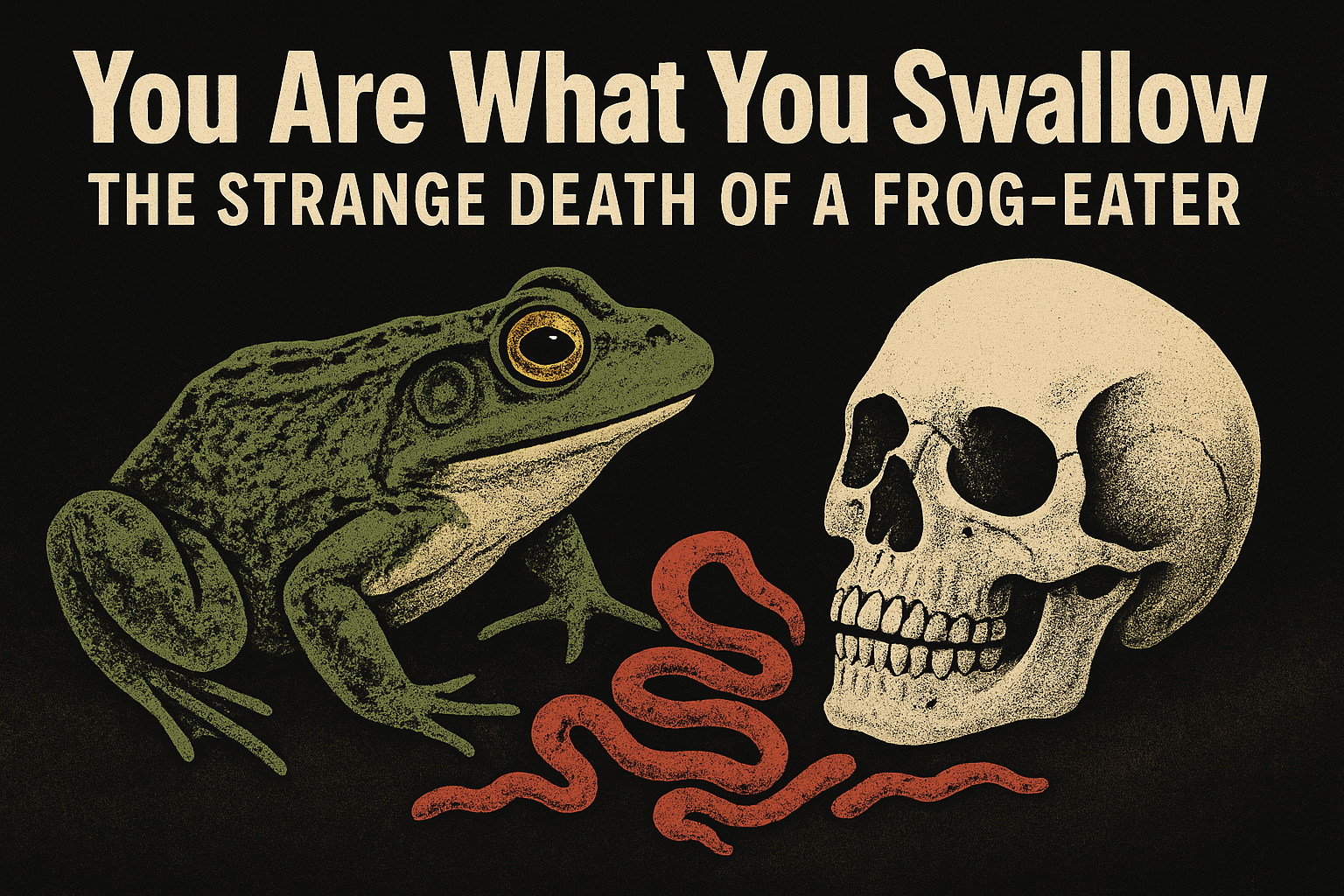I’ve seen some strange things in my life. Things that make you pause and wonder if people are wired the same way across the world. One of those moments was back in my childhood. A butcher, after slaughtering a cow, pulled out the gall bladder, gave a quick grin, and swallowed it whole. No chewing. No hesitation. Just one gulp. When I asked why, I was told it was some form of “spiritual bulletproof”, a way to make his body resistant to live bullets. Yes, bullets from guns. I didn’t know if I should laugh, shiver, or just file it under humans do the weirdest things.
Fast forward to a few days ago, when I read about a man who died after swallowing the intestines of a frog, then chasing it down with alcohol. My mind went back instantly to that butcher. Ritual, superstition, bravery, or just foolishness? Call it what you want, but this man’s tragic ending deserves a closer look.
Why Did He Die?
At first glance, it’s tempting to dismiss the story as yet another cautionary tale of reckless behavior. But if you peel back the layers, the cause of death makes perfect biological sense.
Frogs, unlike cows or chickens, are not typically farmed in controlled environments everywhere. Many are wild, and their intestines can harbor parasites, bacteria, and toxins. When you eat meat, cooking kills these dangers. But swallow a raw frog intestine, and you’ve basically become a five-star hotel for every microscopic guest living inside.
Now mix that with alcohol, which the man supposedly used to wash it down. Alcohol doesn’t sterilize your stomach. It irritates it. Instead of killing bacteria, it weakens your stomach lining, making it easier for pathogens to invade. So, in essence, he opened the door, rolled out the red carpet, and invited every parasite, bacteria, and toxin in that frog’s gut to wreak havoc inside him.

The Toxic Truth About Frogs
Here’s where it gets darker. Some frog species secrete toxins as a defense mechanism. While the intestines aren’t always the primary source, traces can still be present, especially if the frog recently consumed toxic insects or plants. Ingesting those raw means the body suddenly has to fight off a chemical assault it wasn’t designed to handle.
Imagine your liver working overtime trying to detoxify strange compounds while your gut is inflamed from alcohol, and your immune system is ambushed by parasites. It’s like throwing your body into three separate battles at once. No wonder he didn’t survive.
The Superstition Angle
But let’s not ignore the elephant in the room, or in this case, the frog. Why would a man swallow frog intestines in the first place? Most likely, the same reason that butcher swallowed a cow's gall. In many African communities, eating bizarre animal parts is tied to superstition—strength, protection, fertility, or spiritual resilience.
To the man, it probably wasn’t just intestines. It was a shield, a ritual, a way of gaining something greater than himself. Unfortunately, the human body doesn’t bend to superstition. Biology has the final say.
Science Meets Folklore
I think that’s what fascinates me most about stories like this. They sit at the crossroads of folklore and science. On one hand, humans have always turned to rituals for comfort and control. On the other, our biology doesn’t negotiate with myths. You can swallow gall bladders, intestines, or snake blood, but if parasites, toxins, or infections are there, your body will respond the way it always has - with illness.
The man’s death wasn’t just about one bad decision. It was about the clash between tradition and reality.
### What Could Have Happened Inside Him
- If I were to imagine the exact biological chain reaction, it would probably go like this:
- The frog intestine introduced parasites like tapeworms or flukes, which thrive in raw amphibian guts.
- Bacteria such as Salmonella or E. coli likely entered his digestive system.
- The alcohol he used as a chaser weakened his stomach lining, allowing faster absorption of toxins.
- Within hours, his gut would have experienced massive irritation, leading to cramps, vomiting, and diarrhea.
- His liver and kidneys, overwhelmed by toxins, would have struggled.
- If the parasites released neurotoxins or the bacterial load was high, organ failure could have set in.
What reads like a science textbook here, in reality, would have been excruciating pain followed by a rapid decline. A painful, unnecessary death.
The Takeaway
When I read the story, it left me unsettled, not because of the grotesque act itself, but because it showed how thin the line is between belief and biology. We humans have always experimented with the bizarre, whether it’s swallowing raw organs, drinking concoctions, or chasing immortality through rituals. Sometimes, it works in harmless ways. Other times, it writes a tragic obituary.
We need to accept, our bodies are fragile ecosystems. They obey laws of science, not superstition. What you put in them matters. And while cultural practices and rituals have their place, ignoring biology can cost a life.
I’ll never forget the image of that butcher swallowing a cow's gall. He survived, probably because the risk wasn’t as lethal. But the frog eater wasn’t so lucky. His story is both bizarre and sobering.
At the end of the day, no ritual, no belief, no superstition can shield us from what nature has already written into its rulebook. And those rules, unlike myths, are non-negotiable.
Resources
- CDC: Parasites and Zoonotic Diseases
- WHO: Foodborne Trematode Infections
- NIH: Alcohol and the Digestive System
- Mayo Clinic: Alcohol Poisoning – Symptoms and Causes
- Johns Hopkins Medicine: Gastrointestinal Toxicology
- NCBI: Toxicology of Amphibians
Posted Using INLEO